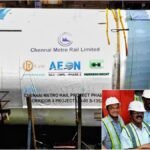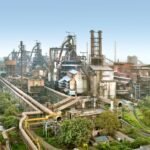Recent Posts
Tata Steel CEO Calls for Government Action to Curb Rising Steel Imports
February 21, 2025NHAI Tightens Quality Control for Reinforcement Steel in Infrastructure Projects

National Highways Authority of India (NHAI) has overhauled its quality control system for reinforcement steel used in government infrastructure projects. A recent policy circular outlines the new Standard Operating Procedure (SOP) that will do away with the one-time source approval system and replace it with a multi-tiered quality assurance system.
Essential Adjustments in Quality Control
The updated system will entail the following by NHAI:
A roster of favored producers for steel reinforcing, cement and emulsion, members of secondary steel producers like SAIL, JSW, JSP, and Tata Steel.
A generic factory inspection checklist:
– A data lake module for tracking and updating the details of factory-manufactured materials.
Independently Speaking, RQOs for Regional Quality Officers will also be established to monitor compliance. Quality inspections, executing the third-party laboratories to do the testing, and conceiving random material samples from each project site would all be their responsibilities.
What About Secondary Steel Producers?
A protocol that forms part of the new policy has decided not to include secondary steel producers in its preferred list of vendors. Steel manufacturers must meet the following qualifications:
An integrated plant setup:
An LRF (ladle refining furnace), which most secondary producers do not own.
This decision comes after concerns about quality problems. NHAI issued show cause notices on June 2024 to 11 steel manufacturers after their reinforcement steel bars were not found compliant with IS:1786 standards in tests done by third-party NABL-accredited laboratories. It was chemical composition, especially phosphorous and sulphur content (affecting tensile strength and ductility) that mattered for highways, bridges or flyovers.
Market Implications:
According to market sources, NHAI’s preference for primary steel producers will affect market dynamics. An Odisha integrated steel mill representative said the procurement emphasis would now be on new integrated LRF-equipped mills and NHAI may no longer procure from induction furnace (IF) mills in the interim.
Accordingly, primary steel prices will remain strong, while secondary steel (30% of NHAI’s 15-18mt per annum total consumption) will be the surplus product in the domestic market, and that will place pressure on its prices.
- #BuildWatchNews
- cement quality
- Construction materials
- emulsion quality
- Government Projects
- Highway projects
- induction furnace steel
- Infrastructure Projects India
- infrastructure quality control
- IS:1786 compliance
- JSP
- JSW Steel
- LRF steel
- NABL testing
- NHAI
- primary steel producers
- quality assurance
- reinforcement steel
- road construction
- SAIL
- secondary steel exclusion
- Steel Industry India
- Steel Manufacturers
- Steel Market Trends
- steel price impact.
- steel procurement
- Tata Steel
Recent Posts
Sourav Ganguly’s Steel Plant to Start Production in 18-20 Months
February 22, 2025Casagrand Expands to Pune with ₹126 Crore Land Deal in Wagholi
February 22, 2025Related Articles
Casagrand Unveils Phase II of French-Themed Residential Project in Chennai
Chennai-based real estate developer Casagrand announced the launch of Phase II of Casagrand...
ByKanmani ChokkalingamFebruary 22, 2025Sourav Ganguly’s Steel Plant to Start Production in 18-20 Months
Speaking at the news conference, Sourav Ganguly noted that his inauguration for...
ByKanmani ChokkalingamFebruary 22, 2025Casagrand Expands to Pune with ₹126 Crore Land Deal in Wagholi
Chennai-based Casagrand Millenia Private Limited has purchased a spacious plot of land for...
ByKanmani ChokkalingamFebruary 22, 2025Koyambedu-Pattabiram Metro Line Will Change the Way People Travel in Chennai
The already extensive Metro network in Chennai is about to get a significant...
ByKanmani ChokkalingamFebruary 22, 2025













Leave a comment